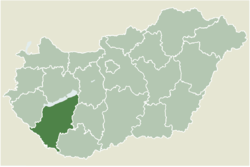| Segesd Šegeš (in Croatian) | |
|---|---|
| Village | |
 Holy well and chapel in Segesd Holy well and chapel in Segesd | |
 Coat of arms Coat of arms | |
 Location of Somogy county in Hungary Location of Somogy county in Hungary | |
 | |
| Coordinates: 46°20′36″N 17°20′51″E / 46.34340°N 17.34754°E / 46.34340; 17.34754 | |
| Country | |
| Region | Southern Transdanubia |
| County | Somogy |
| District | Nagyatád |
| RC Diocese | Kaposvár |
| Area | |
| • Total | 73.09 km (28.22 sq mi) |
| Population | |
| • Total | 2,426 |
| Demonym | segesdi |
| Time zone | UTC+1 (CET) |
| • Summer (DST) | UTC+2 (CEST) |
| Postal code | 7562 |
| Area code | (+36) 82 |
| NUTS 3 code | HU232 |
| MP | László Szászfalvi (KDNP) |
| Website | Segesd Online |
Segesd (Croatian: Šegeš) is a village in Somogy county, Hungary.
Culture
The Hungarian folk song Már megjöttünk estére was collected in 1933 in Segesd by Vilmos Seemayer.
External links
References
| Towns and villages of Nagyatád District | ||
|---|---|---|
| Town (1) |
| |
| Villages (17) | ||
This Somogy county location article is a stub. You can help Misplaced Pages by expanding it. |

